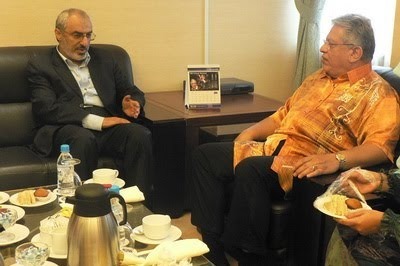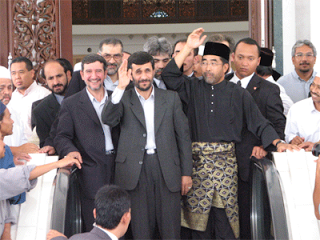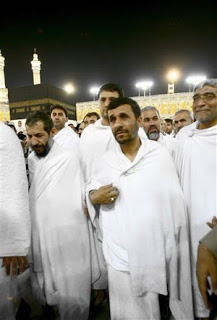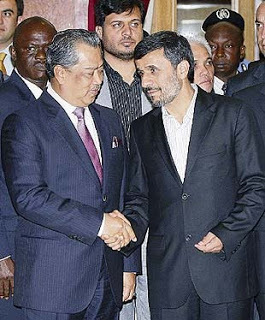Dalam The Sun: 'Aren't Shi'ites Muslims Too?'
 Scene: Restoran Syed, PJ.
Scene: Restoran Syed, PJ.SULOK: I'm a bit confused by the action of some government authorities in breaking up a Shi'ite prayer meeting in a house on the outskirts of Kuala Lumpur last month. According to news reports there were some foreigners as well who were questioned but allowed to go. But no such luck for the locals. I wonder why? Are they not Muslims?
Chong: And then there were statements from the education authorities warning students against joining the group.
Sulok: But why? Are they a deviationist group? Are they deviant Muslims?
Mohan: Are there many of them?
Azman: By some estimates there are about 40,000 to 50,000 Shi'ites in the country.
Mohan: That's big. Even though there are about 17 million Muslims in this country 50,000 is still not small. Wonder whether they are included in the 17 million. What do you think Cikgu?
 Zain: Of course they are. I don't think the religious authorities are aware of their real number. A journalist friend of mine told me that during Tun Dr Mahathir Mohamad's visit to Iran some years ago he saw a group of Malaysian students in Qom waiting to present him with a souvenir. They told him they were studying in the Shi'ite religious colleges there. Later Mahathir asked the Pusat Islam director who was in the entourage whether he was aware that Malaysians were studying in Shi'ite schools. The director said he wasn't aware of it. Of course they would propagate what they learnt when they return.
Zain: Of course they are. I don't think the religious authorities are aware of their real number. A journalist friend of mine told me that during Tun Dr Mahathir Mohamad's visit to Iran some years ago he saw a group of Malaysian students in Qom waiting to present him with a souvenir. They told him they were studying in the Shi'ite religious colleges there. Later Mahathir asked the Pusat Islam director who was in the entourage whether he was aware that Malaysians were studying in Shi'ite schools. The director said he wasn't aware of it. Of course they would propagate what they learnt when they return.Mohan: But I suppose because of the ban against them they don't readily admit they are Shi'ites.
Sulok: But aren't they Muslims?
Zain: Of course they are.
Sulok: But why act against them?
Azman: Of course there are those who would not think so. But I know there are about 400 million of them in the world mostly concentrated in Iran and Iraq. They are certainly part of the 1.6 billion Muslims in the world. There are 2.2 billion Christians divided into 38,000 denominations.
Chong: Naturally the rest of the Muslims are not going to demand that the Shi'ites be excluded when the number of Muslims in the world is being tallied.
Azman: Naturally.
Chong: So if they are Muslims why are they discriminated against by the other Muslims in this country? Cikgu, please?
Zain: It's a long story my friend. It is historical as well as ideological. Briefly, the split into Sunnism and Shi'ism began after the death of the Prophet Muhammad. It became ideological after the descendants of the prophet's grandsons resisted the ruling group that succeeded him. Even though they were killed in a battle between the two groups, their group found support among the Iranians where it more or less acted as a rallying force against domination by the Arabs.
Chong: No Arabs among them?
 Zain: Of course there were. For instance nowadays Arab Shi'ites are in a majority in Iraq. In Malaysia most of the Muslims are Sunnis. The religious authorities are run completely by Sunnis, and they have been defending their turf very well. When the British colonial government took away the power of the Malay rulers they gave them something else to do – devote your time to looking after your religion and your customs, they said. And the Malay elite had no choice. But in time they, aided by their ulamak, became overzealous in what they were doing. Until today. For instance for easy administration they only allow their version of Sunni Islam to be practised in this country. Some have called this version of Islam establishment Islam. And they have created the National Fatwa Council which issues religious edicts which few Muslims dare to dispute.
Zain: Of course there were. For instance nowadays Arab Shi'ites are in a majority in Iraq. In Malaysia most of the Muslims are Sunnis. The religious authorities are run completely by Sunnis, and they have been defending their turf very well. When the British colonial government took away the power of the Malay rulers they gave them something else to do – devote your time to looking after your religion and your customs, they said. And the Malay elite had no choice. But in time they, aided by their ulamak, became overzealous in what they were doing. Until today. For instance for easy administration they only allow their version of Sunni Islam to be practised in this country. Some have called this version of Islam establishment Islam. And they have created the National Fatwa Council which issues religious edicts which few Muslims dare to dispute.Azman: Ya, ya. It banned tomboyism. It banned yoga exercise. And, of course, it banned Shi'ism.
 Mohan: So what the religious authorities are trying to do is to make Malaysian Islam a monolithic faith in the country. Isn't it so, Cikgu?
Mohan: So what the religious authorities are trying to do is to make Malaysian Islam a monolithic faith in the country. Isn't it so, Cikgu?Zain: I think so. I think it is a tough undertaking. Islam as everyone knows is not a monolithic faith. Among the Sunnis itself there are four major schools – Shafie, Maliki, Hanafi and Hanbali. Most Malaysian Muslims are followers of the Shafie school. But the other schools are all acceptable by the religious authorities here.
Azman: What about Qadiani?
Zain: There are some closeted followers here I'm sure. The movement was founded by Mirza Ghulam Ahmad in Qadian, a village in Punjab, in 1889. It was called the Ahmadiyya movement and its followers refer to themselves as Ahmadis.
Chong: What's wrong with the Qadiani movement?
Zain: The Ahmadis consider their founder would return as the Messiah or Mahdi towards the end of the world. Not acceptable.
Sulok: What about the movement which has the Aga Khan as its head?
Zain: The followers of the Shi'ite splinter group call themselves Ismailis, and the Aga Khan IV is their head. Ismailis consider him as the 49th imam which claim lineage from Fatimah, Prophet Muhammad's daughter, and her husband Ali. The Aga Khan commands a huge family fortune which he uses to promote art and architecture all over the world and "towards improving the image of Islam throughout the world." Not acceptable.
Chong: I read somewhere that he leads a flamboyant Western lifestyle mostly in the US and Europe.
 Azman: And then there are the Druzes and the Alawites who sometimes call themselves the Nusayris and Ansaris.
Azman: And then there are the Druzes and the Alawites who sometimes call themselves the Nusayris and Ansaris.Zain: It goes to show that Islam is not a monolithic faith but our religious authorities are trying to make it so. As one so called ulamak said recently "pluralism is bad for the country."
Sumber di sini.
Pembaca dipelawa mengundi, lihat birai kanan blog. Semua dipersilakan menekan punat seberapa yang anda suka malah boleh mengkafirkan penganut Syiah lebih dari sekali. Tetapi ingat, hidup di dunia ini akan disusuli dengan kehidupan di akhirat kelak.
Published on January 25, 2011 19:37
No comments have been added yet.
Faisal Tehrani's Blog
- Faisal Tehrani's profile
- 586 followers
Faisal Tehrani isn't a Goodreads Author
(yet),
but they
do have a blog,
so here are some recent posts imported from
their feed.



